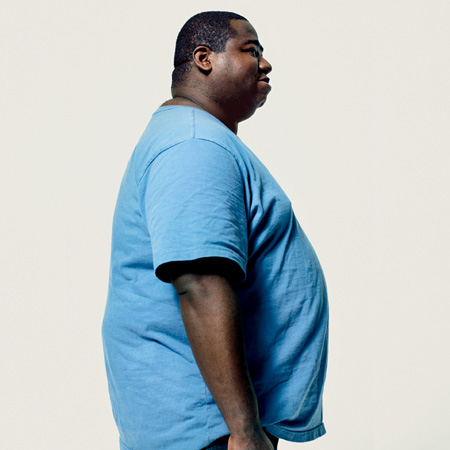Ricky Gervais Wants Respect:
IT'S SATURDAY MORNING in London's posh Hampstead district. On a pretty cobbled lane, diners enjoy a mild day at outdoor tables. Between a realtor and a restaurant is an unmarked door. When the door opens, it appears no one is inside. Then a grin—that grin—flashes in the shadows.
"All right?" he asks.
Ricky Gervais stands a deliberate couple of paces back, just out of view of the Great British public. There's no assistant, no publicist. Just a 50-year-old man in faded sportswear, padding through a basic two-room setup and leading me to a cramped office. One wall bears a Post-it journey through an episode of his new HBO sitcom Life's Too Short. I perch in a chair and he slumps opposite me, slinging his feet onto the table.
He looks well. For Ricky Gervais, he looks very well. When The Office hit in England 11 years ago, with Gervais in the lead role as demagogue David Brent, he was a chunky presence. "I was only playing fat," he laughs now. That role ushered in more successes—The Office's adaptation was a hit in the United States, one of over 80 countries in which it was screened or adapted. There was the HBO show Extras, and a flurry of films (Ghost Town, The Invention of Lying, and Cemetery Junction, among others). Still, Gervais remained defiantly immune to healthy living.
The nadir was shortly after Christmas 2009 when, at home in Hampstead a few streets from where we sit, he settled down to a plate of sausages. "Eleven sausages," he clarifies with a smile. When he looked at the empty plate, something clicked. "I just thought, This is getting fucking ridiculous."
He was hovering around 200 pounds. He's now 168 and still dropping. He has the first hints of the cheekbones he lost in his 20s. While his frame is still thickset, muscle is steadily pushing through.
This committed atheist wouldn't call his sausage meltdown a religious epiphany, and he wouldn't dare call his new regimen a fitness manual. The ultimate aim, he says, is to "stay alive and eat more cheese and drink more wine." Still, he claims he's started habits that he's now addicted to. It's a belated wake-up call, and one that fits a pattern.
"I didn't have a proper job until I was 28. I didn't get into comedy until I was 38, and I didn't start exercising until I was 48."
I don't have to ask the moral of the story. "It's never too late," Gervais says. "Never, ever too late."
FOR A PEEK into Ricky Gervais's childhood, rent Cemetery Junction. This 2010 film, he says, was his "love letter to England, to my past and my upbringing." Gervais was born into a blue-collar family in Reading, 40 miles outside London. His Canadian father was a laborer; his mother stretched the budget to raise four kids. "It's not till you're 16 that you realize she's buying everything out of catalogs and paying for them the rest of the year," Gervais says. "She borrowed tights from my sister. Heartbreaking."
He learned to not feel sorry for himself. "Get on with what you've got," he says. In fact, he didn't even realize he was working class when he arrived at University College London, where he studied philosophy. "Everyone spoke like the Queen," he laughs. "But I was only there to join a band anyway."
The band was called Seona Dancing. Look online to find a coiffed young man with razor cheekbones and a pout. "There's probably only about five photos in the world of us," Gervais says, "and they're all on the Internet."
During his last year in college, Seona Dancing signed with London Records. "I told my mum I was going to be a pop star, and she said, 'Pop star's another name for junkie.' Then I told her the advance, and she said, 'Mick Jagger bought his mum a house in Wales.'"
Gervais envisioned pop greatness. "We met Andrew Ridgeley. Wham! had been touring in the Far East, and he said, 'You're everywhere, you're bigger than us over there.'" He laughs again at the memory. "It lasted 10 minutes."
After two singles that failed to worry the British charts, the band broke up. "Here's what I did wrong," Gervais says. "I wanted to be a pop star, but I should've wanted to be a musician. I forgot about the work, the craft. And I listened to people I shouldn't have. A&R people, the record company."
Value your work and trust your judgment: two lessons that didn't seem much use as Ger-vais slipped from college into unemployment, working menial jobs (or none at all) for 15 years in London. "I remember going home for Christmas when I was 28," he says, "and I couldn't afford to buy anyone presents. I could see that they were all worried about me and I thought, Well, maybe I should be more worried, too."
He eventually moved from a job as a university events manager to a production post at a London radio station. He needed an assistant, and the first person to arrive for an interview was an ambitious young comedy obsessive named Stephen Merchant. They hit it off from the start. Gervais was always clowning around, slipping into a comic persona he called "Seedy Boss." When Merchant landed a job at the BBC, he was asked to produce a short film; Seedy Boss became the subject. Gervais sketched out a couple of office-based scenarios—that's how Seedy Boss became David Brent. And that's how Ricky Gervais became Ricky Gervais.
"Amazing," Gervais says. "I thought, God, this is a lifeline, but I would still have walked away if it wasn't right. I'd done that before, compromised." This time he was going to learn from his mistakes. He both recognized a route to success and knew the pitfalls. "So I dug in."
He told the BBC he'd direct with Merchant—they'd retain final edit, and they wouldn't cast well-known faces. The result, which debuted in 2001 and ran just 14 episodes, was arguably the most influential TV comedy of the decade.
"Since The Office, I've realized that the hard work is the reward," Gervais says. "Just that in itself. Win, lose, or draw. Finishing something, doing it. It's invigorating."
His show Extras further elevated his critical reputation and attracted established stars like Kate Winslet, Chris Martin, and Robert De Niro. Even David Bowie joined the fun, mocking Gervais's character in song as a "chubby little loser." (It's a hilarious YouTube break.)
After years of poverty and obscurity, Gervais had respect, recognition, money, and the job he'd always wanted. "So why wouldn't I give it absolutely everything?" With this sense of industry, it was only a matter of time until he applied his work ethic to his own body.
GOING FOR A RUN with Ricky Gervais is a curious experience. Before we leave his office, he pulls on thick sunglasses and a beanie, but once outside, his fame bounces off those we pass. I tell him I'm worried that I could be mistaken for his gangly sidekick Merchant, and he uncorks a laugh that has weekend ramblers nudging and pointing in recognition.
On the vast parkland of Hampstead Heath, we're on the northern fringe of London; the city's skyline is laid out to our side. Gervais is lost in his work. A question about the mockumentary format sparks a stream-of-consciousness conversation on camera angles. I ask about his plans and he casually mentions that he'll be presenting the Golden Globes for a third time, following his controversial 2010 turn. "Funny, isn't it?" He says drily. "All those people who said I wouldn't work again?"
Half an hour later he's back in his chair, sneakers returned to the table. His chest rises and falls. He talks about running in New York City, where he has a second home, going around the reservoir pretending he's Dustin Hoffman in Marathon Man. "It's so easy," he says. "Get out there, do it, enjoy the results. Why does it always take me so long to work things out?"
-
Less Sleep = MORE Weight
We’ve talked about the importance of sleep in the weight loss/weight
-
3 Fat Loss Mistakes Everyone Makes
While the word fat loss may not be on anyone’s mind right now with New
-
Why Tax Saturated Fat?
Forget whether Denmark’s tax on saturated fat will actually work or no
-
Is Weight Watchers the BEST Diet?
Weight Watchers is the BEST Way to Lose Weight… …at least according t
-
Abs Diet Recipes: Sirloin Tips
Powerfoods: 4 2 teaspoons peanut oil
-
Weight Loss: Healthy Eating and Restaurants
There are a lot of excuses for not eating properly. The most frequent:
- DON'T MISS
- Weight Loss- Abs Diet and Cholesterol Levels
- How Rex Ryan Dropped 100+ Pounds
- Coconut Water -- Miracle Drink?
- 61 Ways to Lose Weight
- Diet Str egies: Foods For Sex
- Train for Life Challenge
- Is Pink Slime in Your Hamburger? Probably
- Abs Diet: Healthy Snacks or Trans Fat
- Build muscle mass quickly with the Abs Diet
- Sports Drinks or Coconut Water?




